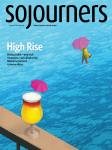IN MAY, the Trump administration ended Temporary Protected Status for Hondurans, opening the door for the deportation of nearly 60,000 legal immigrants to the U.S. and threatening the security of their American-born children. The Department of Homeland Security is systematically stripping TPS status from more than 300,000 people, including immigrants from El Salvador (195,000), Haiti (50,000), Nepal, Nicaragua, and Sudan. Decisions on Yemen and Somalia are expected in July.
Temporary Protected Status enables foreign nationals to live and work in the United States while conditions exist in their home countries that prevent safe return, such as armed conflict, natural disaster, or other extreme circumstances. Hondurans were granted TPS following Hurricane Mitch in 1998. Honduras holds the second-highest rate of nationals murdered after their deportation, according to the Immigrant Legal Resource Center.
The “crucified people” from Central America are “not so much pursuing the American dream as they are fleeing the Central American nightmare,” said Jesuit priest Dean Brackley, who spent more than 20 years teaching in San Salvador, in 2011.
In May, six religious and human rights defenders from Honduras came to the U.S. to describe how that Central American nightmare has become far worse. They reported that 300 people per day are fleeing Honduras following the widely contested presidential election in 2017. Their message? If you want to end migration from Honduras, then cut off U.S. support for the security forces in their country. Invest instead in education, health care, and the release of political prisoners and support free and fair elections in Honduras. Doing so might help restore the rule of law in Honduras and reverse the spiral of violence.
U.S. policy there has helped create migrants by the tens of thousands. Since a U.S.-supported military coup in 2009 that deposed the president, drug trafficking and organized crime have skyrocketed. Honduras has one of the highest murder rates in the world. Corruption is rampant up to the highest levels of government. Human rights violations by security forces are carried out with near total impunity.
Honduran President Juan Orlando Hernández had supported the coup, as a member of Congress, and later engineered the militarization of Honduran society. Hernández was implicated in a massive corruption scandal and has flagrantly violated the Honduran constitution by running for a second term in November. He claimed victory despite such massive fraud that the Organization for American States called for new elections.
The Trump administration quickly recognized Hernández as the winner and consistently celebrates him as a great partner in the region. Hondurans who peacefully protested the flawed elections met excessive violence by state security forces. Dozens were killed and wounded, hundreds more detained.
Jesuit priest Ismael Moreno, a human rights defender in Honduras who received three new death threats following his open criticism of Hernández and the elections, said, “Migrants who head [to the U.S.] are not delinquents, but they are the poor for whom the opportunities to live a life of dignity in Honduras closed. They’re not ... terrorists, nor drug traffickers, and even worse, they’re not ‘animals,’ as Trump called them. They’re people who are desperate, people who have been forced to leave because of a government the United States supports.”
This is a critical moment for Honduras, and one needing the engagement of U.S. faith communities. While previous administrations of both parties repeatedly extended TPS protections for Hondurans, Trump’s decision in May was the latest in a series by the administration ending protections for people from various countries, using a narrow interpretation of the TPS legal statute. TPS recipients, many who have been in the U.S. for two decades, now face heart-wrenching decisions about whether to take their U.S.-born, citizen children back to the furnace of violence their country has become.

Got something to say about what you're reading? We value your feedback!

